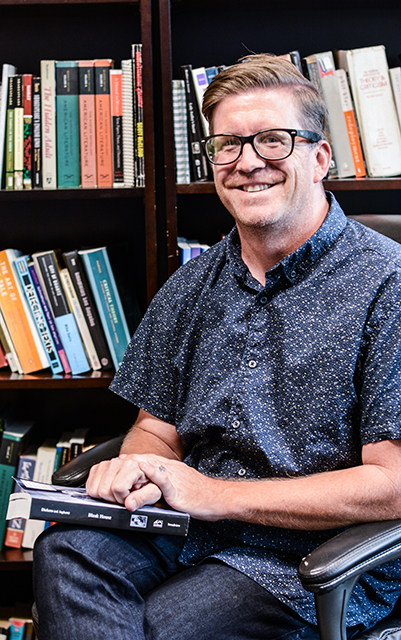Aaron Adams began his career in literature at Vanguard University, studying religion. He describes the process of becoming a lover of English literature as a bug — one most cannot easily shake.
Adams began on the English course during his undergraduate degree at Vanguard University, after his initial commitment to religious studies. He double majored with religion and English, loving the connections between the Christian faith and the process of learning how the English language can be utilized for both beauty and destruction. He then moved to England due to a job offer for his wife, only to finish his master’s degree and earn a doctorate in Literature, Religion and Philosophy at the University of Sussex. Eventually, Adams came back to the states and currently serves as Biola’s English department chair.
What’s your favorite work of literature?
“Golly. I’m going to go with Charles Dickens’ ‘Bleak House.’ It is an amazing book, it does cool things, but I also have an emotional attachment to that book for a variety of reasons [laughs]. I did my dissertation on that book, which could make someone sick of it, right… So yeah, it has an emotional significance but also it’s just really, really good.”
What’s the most interesting thing you’ve found in English? In other words, what drew you to it in the first place?
“I’m kind of fascinated with our storytelling impulse as people. That we — regardless of where we are or if we’re male or female or if we’re from the United States of America or someplace else around the world — we are always going to tell stories and have told stories as a way of expressing some kind of need. The mystery behind that need is what’s interesting to me. Why do we need to tell stories? There’s a lot of things to talk about without having to make things up. But we continue to do it. And what is that about humanity that drives us to tell stories and then return to certain stories again and again?”
What should English mean to people in everyday life?
“The ability to read well is, by extension, the ability to listen well. What I mean by that is you have to be attentive to what the text is saying and that kind of attentiveness is the ability to gather and listen and to ideally empathize. You have to kind of put yourself in the eyes of another. Those are all skills that make for a posture of a really mature Christian attitude toward the world, and the fact that we are listening… For writers, it is that ability to say that language is important and how we speak is important and how we put ourselves out into the world is important, and not just because we want to get a good job, although that is important.”
What kind of advice do you give students beyond the classroom?
“Scripture admonishes us to think about repeatedly the words you say and the words you use. What I tell my students often times is that language is not neutral. Language always has a value to it. It either builds or it destroys — it does something. Language activates something in us. So I think this kind of, this ability for language to — it’s something we need to be like you’re handling TNT, [laughs] you’re handling dangerous chemicals — so you want to make sure you can kind of pay attention to what you’re doing, and do it well.”
On that note, how do you think Biola’s English department provides employment opportunities or skills post-college for students?
“Out there, this idea, which is if you push into data there are certain programs that are not as necessary or important in terms of employability. But I think that one of the misnomers out there, if you read statistics and you look actually what employers are looking for, English is one of those marketable majors… I think the ability to gather information, to critically read, to listen well, to be able to empathize and be able to put ourselves into the world of someone else and to connect concepts, divergent concepts and kind of divergent worldviews, and combine them across and to bring to a point of synthesis and understanding. All of those things are things employers are looking for.”
How do you try to put your department in a Christian context?
“Looking at it in more of a Christian context, which I do, God chose to communicate to humanity through stories and poems and parables and all kinds of different genres of storytelling is how he chose to make himself known, and one of the most important ways of making himself known. So I think there’s something also having to do with our spiritual DNA, because that’s a part of it as well. But I think that’s one of the questions that keeps me coming back, if that makes sense.”







